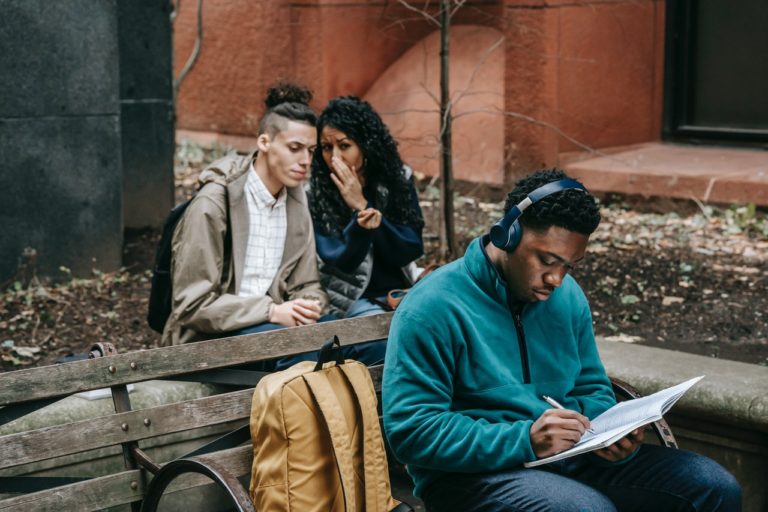Is student collusion serious academic misconduct?

This is the first of two chapters about Collusion Avoidance. To complete this reader, read each chapter carefully and then unlock and complete our materials to check your understanding.
– Introduce the concept of academic conduct at university
– Explore what constitutes academic misconduct and what happens if you’re caught cheating
– Focus specifically on collusion and how to avoid it
Before you begin reading...
-
video and audio texts
-
knowledge checks and quizzes
-
skills practices, tasks and assignments
Chapter 1

When it comes to improving academic skills, most students tend to focus on their reading, writing, listening, pronunciation and perhaps research and presentation skills, overlooking the more general study skills. Yet these general and transferable skills are more often than not critical to academic success, particularly at the undergraduate level. Strategies for notetaking, planning and drafting and avoiding plagiarism time and again prove helpful for students regardless of the assignment they are completing.
In this short reader on collusion avoidance, we discuss in Chapter 1 the importance of following correct academic conduct and how such conduct relates to the act of student-to-student collusion. Then, in Chapter 2, we focus more specifically on accidental and purposeful instances of collusion and provide students with tips for how to avoid breaking some of the most important university rules and regulations.
What is academic misconduct?
When joining an academic institution as a student, you become a member of an academic community and are subject to its regulations and traditions. As a community member, it is your duty to uphold the standards of conduct as outlined in the student handbook of your university. You must ensure that correct personal, professional and academic behaviour is followed so that the well-deserved reputation of your institution can continue. If you do not conduct yourself appropriately and break the rules of your university, you may very well be accused of academic misconduct – placing you in a serious situation. It’s true however that at first many students (particularly those studying abroad or in a foreign university) may be unsure of what exactly constitutes academic misconduct. Should you be unsure of what academic misconduct is, we’ve included some examples below:
- using the ideas or words of another author without acknowledging that author
- working with another student on an assignment that should be completed individually
- resubmitting an assignment that you’ve already submitted in another course
- paying someone to complete an assignment for you
- submitting someone else’s assignment instead of your own
- cheating in an exam or test, such as by bringing in the answers
- stealing, bullying, or any other kind of aggressive and unlawful behaviour
- selling university materials, resources or intellectual property
- missing too many classes or tutorials
- mistreating staff or other students

Why is collusion academic misconduct?
Collusion is a type of academic misconduct that involves more than one person. It is when two or more students work together to complete an assignment that’s intended to be completed individually. It doesn’t matter whether those being accused of misconduct are in different majors, years or universities, if the same work is submitted by multiple students, each student may be thoroughly investigated for the act of collusion.
The reason that universities are so strict about collusion is because being a prestigious institution means upholding standards that ensure to future employers that the learning process of graduates is comprehensive and accurately assessed. If a university were to allow its students to submit each other’s work, there would be no assurance that students were learning effectively or completing assignments themselves. Collusion would therefore devalue the qualification and negatively impact the university’s authority in overseeing academic excellence.
How do universities catch collusion?
Because collusion is so important, universities have adopted a number of methods to catch it in action, although by far the most successful is ensuring that all student submissions are processed through a similarity-checking software such as Grammarly, PlagiarismCheckerX, Turnitin or Urkund. Each software possesses an enormous repository of publications and student submissions for cross comparison. Should the similarity report of your assignment or presentation be above a certain threshold (usually having around 20% similarity with other submissions or publications), then your submission will be investigated more closely.
What happens if you’re caught?
Should a course convenor decide that your paper is too similar to another submission, you will likely be entered into an academic-misconduct procedure. This usually entails being asked to write a short essay about your case, attending a meeting to discuss the circumstances that led to the similarity, and communicating with the panel that decides the outcome. Depending on the severity of the collusion, the honesty and level of the student, and the quality of the university, one or more of the following outcomes may be decided:
- a warning is placed on the student’s permanent record
- the student’s grade is capped at a lower percentage
- the student is awarded a zero for the assignment
- the student is asked to retake the course in its entirety
- a fine is issued to the student
- the student is expelled from the university

Why should you avoid collusion?
Because universities are very effective at determining when collusion has or hasn’t occurred, and because the potential ramifications of collusion can be quite serious, it is very important for any student who wishes to succeed at university that they guarantee they will not be accused of academic misconduct. If you’re a diligent, dedicated and honest student who sincerely wishes to improve during a bachelor’s or master’s degree, then avoiding collusion is generally not a challenge. However, as we will see in Chapter 2, collusion can sometimes be accidental – particularly if a student is not aware of how it can happen. We therefore provide a number of tips to ensure that you don’t find yourself in an academic misconduct meeting. Continue studying with this reader on collusion avoidance to find out more.
Downloadables
Once you’ve completed both chapters in this short reader about Collusion Avoidance, you might then wish to download our Chapter Worksheets to check your progress or print for your students. These professional PDF worksheets can be easily accessed for only a few Academic Marks.
Chapter 1 explores the topic: Is student collusion serious academic misconduct? Our Chapter 1 Worksheet (containing guidance, activities and answer keys) can be accessed here at the click of a button.
Chapter 2 explores the topic: How do I avoid collusion in academic assessments? Our Chapter 2 Worksheet (containing guidance, activities and answer keys) can be accessed here at the click of a button.
To save yourself 1 Marks, click on the button below to gain unlimited access to all of our Collusion Avoidance Chapter Worksheets. This All-in-1 Pack includes every chapter, activity and answer key related this to topic in one handy and professional PDF.
Collect Academic Marks
-
100 Marks for joining
-
25 Marks for daily e-learning
-
100-200 for feedback/testimonials
-
100-500 for referring your colleages/friends